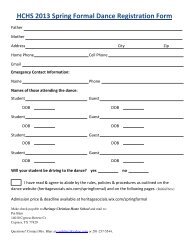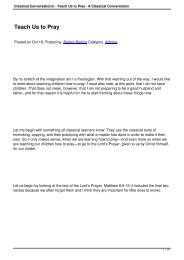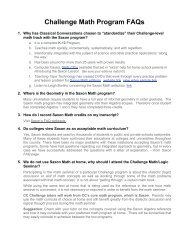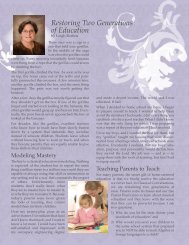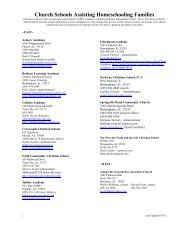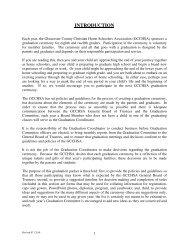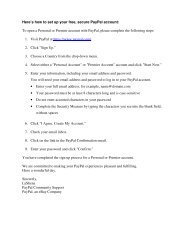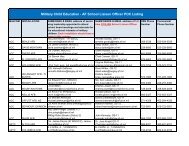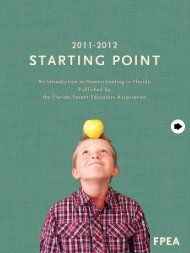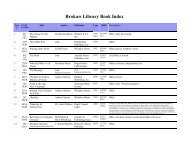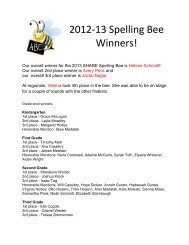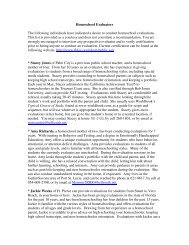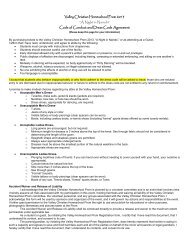Socratic Method - Homeschool-Life.com
Socratic Method - Homeschool-Life.com
Socratic Method - Homeschool-Life.com
Create successful ePaper yourself
Turn your PDF publications into a flip-book with our unique Google optimized e-Paper software.
1. Whete does this story haPPen?<br />
a.<br />
b.<br />
L.<br />
d.<br />
APPENDIXA:<br />
The <strong>Socratic</strong> List<br />
In what country ot tegion does the story happen?<br />
Does the story happen in the country ot the city?<br />
Does the story happen in one spot, or does the action unfoid across a wide area?<br />
\X4eat is the mood or atmosphete of the place where the story happens? Is it cheetfirl and<br />
sunny, or dark and bleak? tWhat words or phtases ot descriptions does the authot use to<br />
cteate this atrnosPhere?<br />
e. W4eat is the weather like in the storv?<br />
f. Do you long to climb into the pages of the book to live in its world, ot does it repel you?<br />
\X4ry?<br />
g. Is the setting a real or imaginary place? If it's imaginary, is it subject to the same physical<br />
laws as our wodd is?<br />
h.<br />
i.<br />
i-<br />
Among what kinds of people is the story set? \Vhat is theit economic class? Horv do<br />
live? Are they hopefrrl? Downtodden? Deptessed? V4ey?<br />
Is there anything slrrnbolic ot allegodcal about the place where the story happens?<br />
Is the setting of the story impottant because of histotical events which may have taken place<br />
there? How does this link help you undetstand the themes of the stofy?<br />
2. When does this stoty haPPen?<br />
^. On rvhat day does the story happen? \Xhat time of day?<br />
b. How long a pedod of time does the story cover? A few minutes? A single day? A whole<br />
lifetime?<br />
c. In what season does the story take place?<br />
d. Does the story happen in a particular year, erz., or age of the rvotld? \ff4eat histotical events<br />
may have iust'precied the iedod of the story? Do these events help explain the actions of<br />
characters, the action of the story, or its mood? (fot example, is the story set in the midst of<br />
the Industrial Revolution in England like some of Charles Dickens' wotks, or is it set ifl the<br />
roadng 20,s in Amedca when life was gay and times wete good?)<br />
e. In what time of life for the main charactets do the events occur? Are they childten? Are<br />
they just passing into adulthood.? Ate they akeady gtownr,rps? Does setting the story in this<br />
oatticulartime of the charactets' lives make the story better?<br />
66 The Center for LiterarY Education<br />
they<br />
€<br />
€<br />
€<br />
€<br />
€<br />
€<br />
€<br />
€<br />
€<br />
€<br />
€<br />
€<br />
(<br />
J.
t<br />
E<br />
rt<br />
E<br />
rt<br />
t<br />
It<br />
rt<br />
E<br />
t<br />
rt<br />
It<br />
E<br />
It<br />
E<br />
rt<br />
It<br />
E<br />
rt<br />
E<br />
rt<br />
E<br />
rt<br />
It<br />
a<br />
rt<br />
t<br />
rt<br />
It<br />
It<br />
a<br />
t<br />
a<br />
f<br />
f<br />
f,<br />
f,<br />
tr<br />
f<br />
tL-<br />
f. In what inteilectual pedod is the story set? W&rat ideas wete prevalent during the pedod of<br />
the story? Does the author deal with these ideas through his characters? Do the characters<br />
tespond to social nrles and customs that ate the tesuit of these ideas? Sane Austen's books,<br />
fot example, were set in the early 19th century in England, when women were bound by<br />
social laws fotbidding them from owning ot inhedting property. Consequently, mariage to<br />
men of ptoperty was their only soutce of financial secudw. Sfithout this knowledge, the<br />
dialogue in Pride and Ptejudice, and the action of Emma, are r:nintelligible to the modem<br />
reader.)<br />
3. Who is the story about? @Ial be asked of pmtagonist or arE other cbaracter)<br />
a. Is the charactet arr' rr or an arrimal?<br />
b. How old is the charactet?<br />
c. Is the character male ot female?<br />
d. \Vhat does the chatactet look like (rair, eyes, height, build, etc.)?<br />
c.<br />
f.<br />
g.<br />
h.<br />
Is the chatacter sane or crazy?<br />
Is the character kind, gentle, stern, emotional, hatsh, logical, rational, <strong>com</strong>passionate or<br />
exacting...? Make up a list of adjectives that descdbe the protagonist. \What words or<br />
actions on the chatacter's pa-rt make you choose the adjectives you do?<br />
Of what nationality is the character? Does he live in his native land, or somewhere else?<br />
\X4rat does the character do fot a living? Is he a ptofessional, ot a blue-collar worker? Is he<br />
wealthy ot impovedshed? Is he content with his lot in life, or does he long to improve<br />
himself,like Pip in Creat Exputations?<br />
i. Is the chatacter educated? To what degtee? How do you know?<br />
j. What does the chatacter say about himself to other people?<br />
k. \X4rat do other characters think ot say about him?<br />
l. Is the chatactet a membet of any patticulat lsli.glous ot social group? If so, what do you<br />
know about this gtoup? \ff4rat motivates this group? Vhat do its members feel to be<br />
important?<br />
m. V4eat does the character think is the most important thing in life? How do you know this?<br />
Does the chatacter say this out loud, or do his thoughts and actions give him away?<br />
n. Do the charactet's priorities change over the coutse of the story? In what way? $7hat causes<br />
this change? Is it a change for the better, or for the worse?<br />
o. How does the petsonality of the character reflect the values of the society (or individual) that<br />
ptoduced the story?<br />
p. Is the charactet a tvpe or archetype? Is he an "Everyman" with whom the reader is meant to<br />
identi$'? Are his struggles s).rrnbolic of human life genetally in some way?<br />
q. Is the character a "svmpathetic character"? Do you identi$r with him and hope he vrill<br />
succeed? Do you piw him? Do you s<strong>com</strong> or despise his weakness<br />
in some way? V4ey?<br />
Teaching the Classics: A <strong>Socratic</strong> <strong>Method</strong>for Literary Education 67
4. Who else is the story about?<br />
a. Is there a single character (ot a gtoup of characters) that opposes the protagonist in the<br />
story? In other words, is there an antagonist?<br />
b.<br />
d.<br />
In what way is he antagonistjc? SThat goal of the protagonist is he opposed to?<br />
What actions does he take to oppose the protagonist?<br />
Is the antagonist out to do physical harm to the protagonist, violence to his reputation, his<br />
memory, his work ot his familv? How do you know?<br />
e. How does the author's description of the chatacter inforrn you oIhis antagonism? Does he<br />
have any physical atttibutes or petsonality ftaits that mark him as antagonistic?<br />
f. \il&v does he oppose the protagonist) Does he merely belong to a different social gtoup?<br />
Does he see the wotld in slightly different ways? Ot is he an evil villain, like Shakespeare's<br />
Iago?<br />
G<br />
f)<br />
. Is he teprehensible, so that none would wish to be like him?<br />
h.<br />
How do this charactet's wotds and actions affect those around him?<br />
i.<br />
'<br />
Does his presence corrupt?<br />
Is he strangely attractive? Does he draw others into his wicked sensibilities (i.e. \Wormwood,<br />
Screwtape l:tters)? Does he seem somehow rational, justi{ied, even righteous in his actions<br />
(i.e. Javen, I-zs Miserab/es)?<br />
k. Has the antagonist always opposed the protagonist? If not, what caused his change of<br />
direction? Was there a turning point on his road to antagonism?<br />
I. Does the author believe this character to be tesponsible for his own sinfrrlness, or does he<br />
believe him a product of a "negative environment"?<br />
m. Is the antagonist ftuly evil, by definition, ot is he metely antagonistic to the protagonist by<br />
virtue of his vocation or duty?<br />
n. What are the antagonist's surtoundings (does he live next doot to the dump like Bob Ewell<br />
n To Kill a Mockingbir4? Are they telated to his character? Did the authot pur him there on<br />
purpose?<br />
5. What does the protagonist want? (hIa1 a/so be asked of other cltaracters)<br />
^.<br />
b.<br />
Fill in the blank Ttris story is about the protagonist trying to _.<br />
Does he attemPt to over<strong>com</strong>e something - ^ physical impediment, or an emotionai<br />
handicap?<br />
c. Does he strive to over<strong>com</strong>e a physical obstacle outside of himself (An ocean, for example,<br />
like Chdstophet Columbus, ot nature generally, like aJack London character)?<br />
68 The Center for Literary Education<br />
e aaIIIII1l<br />
1<br />
d
t<br />
t<br />
D<br />
;<br />
a<br />
t<br />
D<br />
a<br />
a<br />
a<br />
D<br />
t<br />
E<br />
a<br />
a<br />
a<br />
a<br />
t<br />
a<br />
E<br />
t<br />
4<br />
It<br />
E<br />
E<br />
4<br />
t<br />
E<br />
a<br />
t<br />
t<br />
t<br />
a<br />
It<br />
a<br />
t<br />
t<br />
E<br />
E<br />
t<br />
rt<br />
E<br />
t<br />
d.<br />
e.<br />
f.<br />
Does the ptotagonist try to capture an object (fhe Silvet Chalice)?<br />
i. Or a person (Agatha Chdstie's Hetcule Poirot)?<br />
ii. Or a beast (St. George and the Dragon)?<br />
iii. Or a perfect wodd (Thomas More's Utzpia)?<br />
iv. Ot a mate (Pride and Prqjudice)?<br />
v. Or fieedom (Hartiet Tubman)?<br />
vi Or success (Coodb1e, Mr. Chips)?<br />
vn. Or justice (]ean Valjean of Its Miserables)?<br />
vin. Or inner peace (The Brothers Karamaqou)?<br />
tx. Ot contentrnent (does he even know what he's looking for)?<br />
Is the conflict an extemal one, having to do with circumstances in the protagonist's physical<br />
wodd, or is it an rntemal conflict, taking place in his mind and emotions?<br />
Do his objectives or goals change throughout the story? How? W4ry?<br />
6. Why can't he have it?<br />
^. Do physical or geogtaphical impediments stand in the chatacter's way?<br />
b. Does the character lack strength, mental acumen or some other necessary ability?<br />
c. Does he lack self-confi.dence, good health, or social connections?<br />
d. Does the character's age, economic class, race, or sex stand in his wav?<br />
e. Is the character racing against time?<br />
f. Are thete people other than the main antagonist who represent an obstacle to<br />
character's pursuit of his goal?<br />
g. Is the conflict a m^n v. man struggle?<br />
h. Is the conflict ^rrrafl v. nature struggle?<br />
i. Is the conflict a marr v. God struggle?<br />
i.<br />
Ir the conflict ^m n v. society struggle?<br />
k. Is the conflict am^n v. himself struggle?<br />
l. Does God himself (ot Providence, ot Fate) oppose the character? How do you know?<br />
7. What othet problems are there in the stoqy?<br />
a- Ate there other things in the story (people, responsibiJities, etc.) that distract the characters<br />
ftom theit main goals?<br />
b. Do chatacters' actions provoke ftrtther conflict or unrest in the story?<br />
Teaching the Classics: A <strong>Socratic</strong> <strong>Method</strong>for Literary Education 69<br />
the
c. Is the protagonist involved in more than one important conflict in the story (Scout vs. Boo<br />
Radle,v and Bob Ewrll n To Kill a Moc,kingbird, for exampie)?<br />
d. Are there other charactets in the story who don't r:ndetstand the ptotagonist's motives and<br />
ambitions?<br />
e. Is there a conflict within the conflict (As when, for example the mutdetet turns out to be the<br />
detecdve's wife)?<br />
f. Ate there larger issues, (a laryer context or frame) in which conflict exists and forrns a<br />
baclground fot the story (A war setting, for example)?<br />
8. What happens in the story?<br />
a. W4eat major events take place in the story as a result of the conflict?<br />
b. How do the protagonist and r},.e antagonisl tespond to the conflict at fust? Do these actions<br />
ptovoke fi:rthet conflict?<br />
c. How do the interactions of the chatactets heighten the tension of the conflict that exists?<br />
d. \X4eat extemal impulses heighten the conflict - lveather, wat, surffrrer brea\ separation,<br />
sickness. etc?<br />
9. How is the main problem solved?<br />
^. Does the protagorrist get what he's after?<br />
b. How are the ptotagonist's obstacles finallv ovet<strong>com</strong>e?<br />
c. Is the siruation pleasandy resolved, ot is it resolved in a terible way?<br />
d. \ff4eat events form the highest point ot climax of the storv's tension? Are they citcumstantial<br />
events, or emotional ones? Is the climax a spirirual ot physical one?<br />
e. Does the protagonist solve his own dilemma? Is it solved by some extemal source or 3d<br />
pafiy? Is he helpless in the end to achieve his goal (like Frodo n L"ord of the Nngs), ot does he<br />
triumph bv virtue of his own effotts (Odysseus n Tlte Odlssej?<br />
f. Does the big conflict develop into a larget batde?<br />
10. How does the stoty end?<br />
^. After the climax of the story, did you wonder how it would end? How does it end? How<br />
ate the "loose ends" tied up? Wete all of yout questions answeted?<br />
b. Were you satisfied vrith the tesolution? If not, why not?<br />
c. Do t-ou believe the characters' responses to the cataciysmic events, or afe they anti-climactic<br />
in some regard?<br />
d. How does the solution of the conflict affect each individual character?<br />
70 The Centerfor Literary Education<br />
e J<br />
2<br />
2l<br />
?<br />
€<br />
e €<br />
€<br />
/<br />
I<br />
/<br />
€<br />
€<br />
(<br />
€<br />
€t<br />
(<br />
€<br />
€<br />
€<br />
€<br />
(<br />
€<br />
€<br />
(<br />
€<br />
(<br />
€<br />
C<br />
€<br />
€<br />
€<br />
e<br />
€<br />
€<br />
€<br />
€<br />
€<br />
€<br />
€<br />
€<br />
€
E<br />
E<br />
a<br />
E<br />
a<br />
E<br />
E<br />
E<br />
E<br />
e. Does the ending ot tesolution of the story make any kind of judgments?<br />
f. Does the resolution offer anv particular perspective or r:nderstanding of the story's themes?<br />
11. What does the ptotagonist learn?<br />
^. Is the protagonist changed in his mind or heart by the events of the story?<br />
b. Does he begin to act diffetendy? In what way?<br />
c. Is he ennobled?<br />
d. Is he sacdficed in some wav? (was this a pat of the climax or tesolution?)<br />
e. Does the rnztn chatacter explain to the teader his petspecfive on the events that have<br />
transpired?<br />
f. Does he draw upon any motifs or syrnbols to deepen his explanation of these events?<br />
12. What do the other characters learn?<br />
a. Are othet people in the story ennobled, changed, saved, imptoved ot otherwise affected bv<br />
the story's events?<br />
b. Do the,r' look at themselves differently at the end of the story?<br />
c. Do they look at the ptotagonist differendy?<br />
d. Do they look at their surroturdings or situations differendy?<br />
e. Do they re-exatnine theit values and ideas?<br />
L3. What is the main idea of the story?<br />
^. Does the story seem to deal with a universal theme like the ones listed in this syllabus-i<br />
b. Does the story offer an answer to a particulat problem associated with one of those themes?<br />
c. Does the story merely cali the teadet's attention to a theme without tf itg to solve anvttring?<br />
d. What answer does the story seem to suggest for the question,'flMhat is a good life?"<br />
e. Wihat aspect of the human condidon is brought to light and wondeted at in this story?<br />
L4. Does the authot use the sounds of out language to create interest in his story?<br />
Onornalopoeia -<br />
a. Does the authot use sound words to tell tris ston'?<br />
Teaching the Classics: A <strong>Socratic</strong> <strong>Method</strong>for Literary Education 71
. Does pop<strong>com</strong> pop, soda pop fizz, and a hom bleat on any of the pages? Do any similar<br />
word sounds appear in the text?<br />
Assonance -<br />
c. Does the authot use words in sequence ot in close proximity which have the same internal<br />
vowel sounds?<br />
Consonance -<br />
d. Does the author use words in sequence or in close proximity that each end with the same<br />
consonant sound?<br />
Alliteration -<br />
Rhlme -<br />
e' Does the authot use wotds in sequence or in close proximity that repeat the same initial<br />
consonant sound?<br />
f' Does the authot end wotds or lines with the same final sound to create a musical qualiry<br />
wiftin the text?<br />
L5. Does the author use <strong>com</strong>mon words and phrases in un<strong>com</strong>mon ways?<br />
Underslatement -<br />
a. Does the autlor intentionally represent things in language that is less strong than the<br />
situation ot thing would necessarily warrant for purely rhetorical effect? (For example, in<br />
Ian Falconer's O/ivia, the natrator mentions that Olivia leams to make sandcastles "rd g.t,<br />
"pretty good." The picture with the text is of a sand-cast model of the Empire State<br />
Buiiding. In The Bigttt Bear, the authot mentions the trappers from the zoo were "a little<br />
surprised" to see the boy in the trap with the bear.)<br />
Hlperbole -<br />
Clichi -<br />
b. Does the author overstate or exaggerate things to make a point?<br />
c. Do characters within the story make gtoss overstatements to ddve home an issue or idea?<br />
d. Does the autfrot use figures of speech or exptessions that are corrunon and. overused?<br />
Oxlmoron -<br />
e. Does the author use sayings that are uriser than they appear at fust glance?<br />
f. Does the authot juxtapose rwo normally contradictory wotds or ideas for the sake of making<br />
some u'ise insight? (i.e. a healing wound, a u'ise fool a cruel kindness, icy hot)<br />
72 The Centerfor Literary Education
16. Does the author use descriptions and <strong>com</strong>parisons to create pictures in the teadet's<br />
mind?<br />
Inagery -<br />
Sirnile -<br />
^. Does the authot create snapshots of images in the mind of the reader for the sake of<br />
enhancing meaning, cteating setting ot rnood, or deveioping chatacter?<br />
b. Does the author relv upon sitniles, metaphots or petsonifi.cati.on to convev his meamng<br />
more pov/erfi.illy?<br />
c. Does the author describe things by shorving them to the teader via word pictwes rather than<br />
metelv telling the readet about them?<br />
d. Does the authot use the words "like" or "as" in making <strong>com</strong>parisons between two or more<br />
dissirnilar thinss?<br />
Personifcation -<br />
e. Does the authot represent inanimate objects as being lifelike or human?<br />
f. Do things or creafures speak urith human voices, exptessing rational thoughts and ideas?<br />
g. Do trees have atms and dance in the \Mind? Do birds sing sweedy in praise to God? Does<br />
the thundet bellow a warning note? Does the wind howl, "Go Hooome!" as it did tn Braae<br />
Irene?<br />
Met@hor-<br />
h. Does the author make <strong>com</strong>patisons of dissimilat objects ot things without the use of the<br />
words "like" or "as"?<br />
i. Does the authot call one thtng ot object anothet?<br />
i.<br />
How does this help the author cteate a mood fot the story?<br />
k. How does it help him emphasize a theme?<br />
l. Ate any metaphots extended thtoughout the whole story, so that they sor:nd like themes?<br />
(Slnbok)<br />
17. Does the author use the characters and events in his story to <strong>com</strong>municate a theme that<br />
goes beyond them in some way?<br />
Iroryt -<br />
d. \X4een read litetall1', do the words of a charactet ot narrator offer informati.on that contradicts<br />
with what you've already discovered to be true about his or het (a character's) circumstances,<br />
character, or thoughts?<br />
e. Do you know mote about the character than the character himself does at any point in the<br />
stow (dramatic inltJ?<br />
Teaching the Classics: A <strong>Socratic</strong> <strong>Method</strong>for Literary Education 73
Allusion -<br />
f. Does the author tefer to other wotks of literature, histodcal events, wotks of att, ot wellknown<br />
ideas in his wotk?<br />
g. Does the authot's tefetence to other wofks, eveflts, or ideas serve to underscore and enrich the<br />
teadet's understanding of an event or chatacter in the story?<br />
Foreshadawing-<br />
h. Does the author provide any clues eatly in the story of things to <strong>com</strong>e in the plot?<br />
i. Are there any hints of <strong>com</strong>ing doom, disastet, excitement, blessing, or action?<br />
i.<br />
D" characters utter statements that appeat ironic in tettospect aftet the action occuts? Does<br />
the author let you in on the inner thoughts of his chatactets fot the sake of r:ndetscoring<br />
potential disasters ot evefits ahead in the story?<br />
Synbolism -<br />
k. Does the author use any objects or ideas to tefet to ot embody acharactet quality or personal<br />
ftait? Fot example, in To f'xll A Mockingbird, Jem, Scout, Tom Robinson, and Boo are all<br />
"mockingbirds." It's a sin to kill thern since, in their innocence, they do nothing but sing their<br />
song to the Lotd.<br />
I. Does the authot use any objects, persons, pictutes, or things to represent an idea in the story?<br />
Fot example, darkness may be used to represent wickedness. Lght may be used to reptesent<br />
truth and goodness. In the allegorical play, Everyman, the rnain chanctet reptesents or<br />
svmbolizes sinfirl man. The s).nnbol of a dove represents the person of the Holy Spirit.<br />
18. Who is the author?<br />
a.<br />
b.<br />
d.<br />
e.<br />
f.<br />
What is the authot's name?<br />
Is the authot afirarr ot awoman?<br />
How old was the authot when he wrote the story?<br />
\7as the author huppy ot unhappy? Friendiy or teclusive?<br />
\What kinds of relationships did the author have? Did he have a family? Was he an orphan?<br />
Did the authot suffet any hardships in his life that might have made him think ot feel a<br />
cettain way about his subject?<br />
g. Do the answers to these questions make themselves apparent in the authot's story? In what<br />
wavs?<br />
L9. Where did the author live?<br />
^. In what country did the authot live? In what city or state?<br />
b. Did the authot live in the crty, ot in the countryside?<br />
c. Did the author live in poverty, or <strong>com</strong>fott?<br />
74 The Centerfor Literary Education<br />
d<br />
a aaaaaaaaaaaaaaaaadaaaeeeeeeeeeeeeeeeceeeae
d. Do the answers to these questions make themselves aPPatent in the authot's story? In what<br />
wavs?<br />
20. When did the authot live?<br />
a. In what year was the author bom? W4ren did he die?<br />
b. \What events took place in the world during the author's lifetime? Did the authot know<br />
c.<br />
d.<br />
about them? Was he involved in them?<br />
Does the author refet to the events of his lifetime in his story?<br />
Do the answers to these questions make<br />
ways?<br />
2L. What did the authot believe?<br />
a. Was the authot a believet in a particular teligion?<br />
themselves apparent in the authol's story? In rvhat<br />
b. Was the authot a member of a certain political parfy or other otganization?<br />
c. Was the author associated with a particular social cause or movement? (Examples include<br />
temperance, abolitionism, women's sufftage, civil rights, Puritanism, etc)<br />
d. Was the author associated with a patticular intellectual school ot mode of litetature?<br />
(examples include Romanticism, Transcendentalism, Existentialism, Natutalism, Realism,<br />
Postmodetnism, etc)<br />
e. Do the answers to these questions make themselves aPparent in the authol's story? In what<br />
ways?<br />
f. Was the author's wotld view in any way threatened by new philosophies, scientifi.c<br />
discoveties or oetsonal circumstances? Was this conflict reflected in his stories?<br />
Teaching the Classics: A Souatic Methoclfor Literary Education 75



